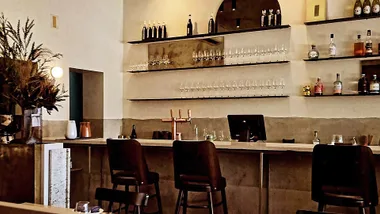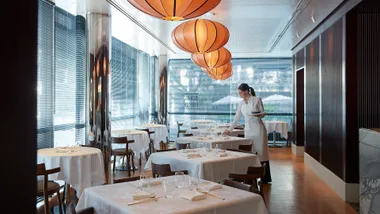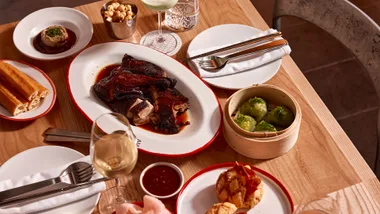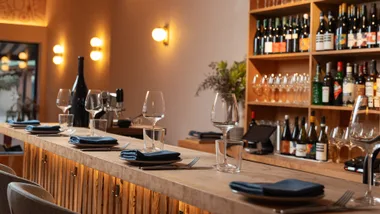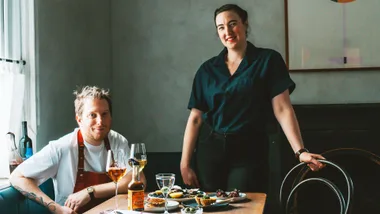To do it right, you should really start with Elyros’s signature cocktail, a mix of Greek sparkling wine, a honey-infused Cretan liqueur and bitters, garnished with a sprig of fragrant thyme. The drink seems familiar at first, probably because of its classic Champagne cocktail roots, but then something savoury kicks in – notes from the thyme plus the underlying thud of the rakomelo liqueur. Suddenly it’s not so familiar. There’s a new slant. Interesting. Refreshing.
And that’s the way Elyros rolls. This is a Greek restaurant that’s fiercely committed to the seasonal and regional approach that underpins the cuisine of Crete (which means plenty of olive oil, octopus, horta, yoghurt and lamb on the menu), but the usual grilled meat, saganaki, dips and pita part of the Greek-restaurant equation is notably absent. The result is a menu full of fresh, lively food offerings that comfort and surprise.
Elyros is named for an ancient city in the south-west of Greece’s largest island. It’s not the only restaurant in town that takes Crete as its inspiration, but it’s perhaps the most committed to the cause and, with a crack team behind it, it’s certainly the most refined. Two of the owners, Angie Giannakodakis and Guy Holder, have worked across an impressive number of leading Melbourne restaurants, but have lately made their names with the much-loved, city-fringe diner Epocha. Giannakodakis has long been one of Melbourne’s most charming and enthusiastic spruikers of Greek food and culture (many will know her from her time at The Press Club and Hellenic Republic), and there’s certainly a strong sense of relaxed Hellenic hospitality at Epocha, even though the menu ranges further afield than Greece.
At Elyros, the tighter focus on Greece has been further honed by the partnership with former Epocha staffer Disa Dimitrakakis, whose parents hail from Crete. Dimitrakakis and Giannakodakis were on Crete, specifically at a bar around the corner from the restaurant where they intended to eat, when the idea for Elyros coalesced. It’s the simplicity of that bar’s food that underpins the menu.
Take the raw fish dish. It neatly encapsulates the simple joys of the best fish available that day – sometimes hapuku, at others perhaps kingfish or tuna – accented with olive oil, lemon juice and fresh thyme. The texture and the thyme nail it, but they’re ably assisted by the grassy, tangy supporting cast.
The impressively powerful pipis are served on the half-shell, garnished just with a couple of lemon cheeks. The pipis have an amazing depth of savoury-sweet brininess achieved by simply steaming them in their own juices.
The same goes for a quite brilliant octopus tentacle, again cooked in its own juices in a sealed pot. It gets a little dressier with petimezi, though, a sticky-sweet fermented grape syrup that’s a brilliant counterpoint to the fresh rich octopus and pickles – red onion, garlic and baby radish – sharing the plate.
Of course, such skilfully honed simplicity is a lot harder to achieve than it reads. This is where chef Yiannis Kasidokostas steps in. A native of Athens who has worked in starred restaurants in Europe, Kasidokostas has the kind of skills, experience and, indeed, the feel needed to make simplicity sing in restaurant form.
He plates beautifully, even when it’s just a single ingredient. Artichokes braised in lemon and oil, for example, seem to have been tossed nonchalantly into a dish, but there’s something artful about the way they’re tossed that might have you reaching for Instagram.
It’s clear Kasidokostas has found great inspiration in the Cretan kitchen. The island is self-sufficient, with many of its people still basing their diet (one of the healthiest in the world) on what Crete and its surrounding waters produce each season. This is the way Kasidokostas likes to run his kitchen.
He makes his own tomato paste, stocks and sausages, ages his own cheese, smokes his own meat and sources whatever wild greens are available from a small battalion of foragers around the city. The keep-it-simple force is strong in this one.
The idea of keeping it simple also carries through to the décor; the split-level site in Camberwell, which once housed Magic City, has been pared back to a degree that edges towards stark.
It’s certainly an elegant fit-out: polished concrete floors, white walls and metal-framed windows, meticulously aligned marble-topped tables and dark timber chairs. A few subtle design flourishes – such as a muted, patterned wallpaper on one wall, an antique wooden front door, grey-blue and white ceiling, and comfortable banquettes – keep it from toppling over the edge into outright chilliness, but you can get the feeling this is a room ideally suited to a sun-splashed Greek island. In its Camberwell location, it sometimes feels in need of a little more decorative fluffing to warm it up.
You will find no lack of warmth, or information, from the service crew, a charming group of folk who understand the appeal of a brief explanation and only air the turbocharged version if and when it’s asked for. But it’s a good idea to ask because the explanations and anecdotes are often enlightening and entertaining. You may well find yourself afterwards figuring out how to fit Crete into your next overseas jaunt.
The bar, with its top shelf full of oversized and spotlit terracotta urns, is definitely the warmest place in the restaurant, and a good place to come to grips with the Elyros drinks list. It’s lengthy and covers a lot of ground – Greece, France, Austria, Germany, Italy, Spain, Slovakia, Romania, Hungary and Slovenia in Europe alone. There’s plenty of good stuff and the compact selection of Greek wine – including a small sampling from Crete – is due to expand and improve in the coming months.
The breadth and geographical diversity of the wine list (South Africa, Napa Valley, Argentina, Lebanon, Australia and New Zealand) is a little bewildering, given how focused the rest of the place is, but with straight-talking wine guy Thomas Eveno in the house to help out, you won’t stay bamboozled for long. The list also includes a generous and interesting selection of wines available by the glass, which is a good way to go at Elyros with flavours that bounce around the place.
The snails stifatho, with its rich, deep-red tomato sauce (using that house-made tomato paste), is fragrant with cloves, cinnamon, garlic and red wine. The snails, in their shells, are steamed and finished in the sauce so they’re not overpowered by the big-flavoured concoction, but enhanced by it.
The apakia, pork loin that’s been brined for 12 hours before being smoked over applewood, is sliced and pan-fried to order and served, beautifully, with capers, wild greens, slivers of red onion and a red wine vinaigrette.
The Cretan salad is an ever-changing combination of leaves and vegetables driven by the season and accompanied by super-crunchy pieces of rusk (watch your teeth) and sheep’s milk ricotta that’s been aged for about a month so that it has a beautiful salty, slightly sour quality to it that works excellently with the wild greens.
Chicken – a confit leg and sous-vide breast – comes served with trahana (a cracked wheat softened and slightly soured with goat’s milk) and sheep’s milk yoghurt. And, of course, not to be overlooked is the must-do goat dish. Using a traditional Cretan recipe the goat is slow-cooked overnight in orange juice, lemon juice, olive oil and meat juices. The flavour is powerful, complex and slightly astounding, given the simplicity of the technique. It’s also a beautiful dark-brown colour and as tender as any goat could be.
Desserts are limited to a compact list of three, but the size of the list is a good argument for the small-is-beautiful theory. Take the revani, a sweet, slightly chewy cake-like dessert made with sheep’s milk yoghurt and drenched in a thick, sweet syrup flavoured with fennel seeds and orange. There are doughnuts or, more correctly, xerotigana – swirls of fried dough flavoured with a syrup made with sugar, cinnamon, honey and orange, and sprinkled with crushed walnuts and a little cinnamon powder. Traditionally served at celebrations, such as christenings and weddings, they are worth celebrating all by themselves.
Elyros may not necessarily signal that Melbourne’s Greek restaurants are moving away from the generic and towards regionality, but it’s an excellent sign for the city’s dining culture as a whole.
It’s a pleasure to eat food that’s a step or two off the beaten track and even more pleasurable still when the food comes from a team – owners, kitchen, floorstaff – who are genuinely, palpably enthused by what they are offering, and finessed in delivering it. All this and it’s good for you too. Win-win.


